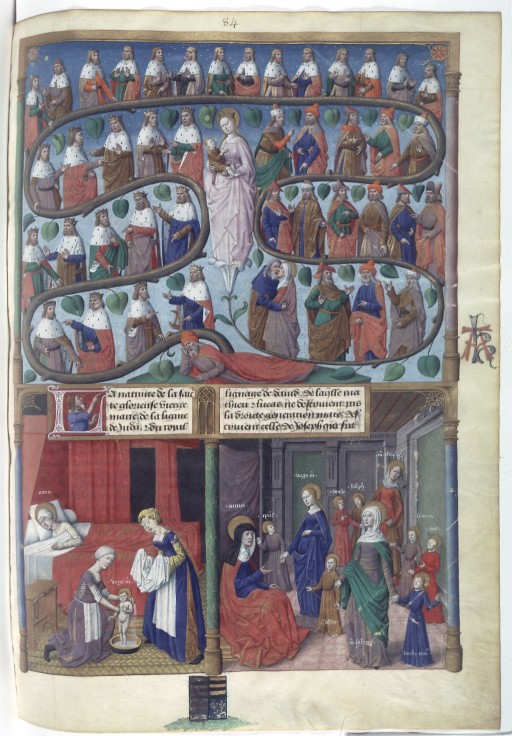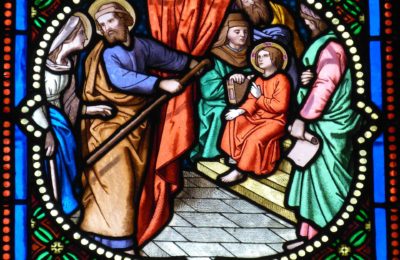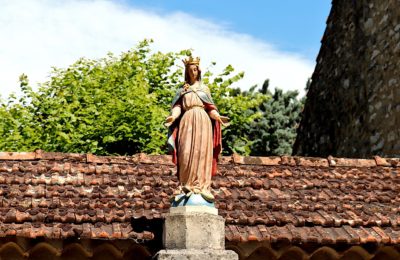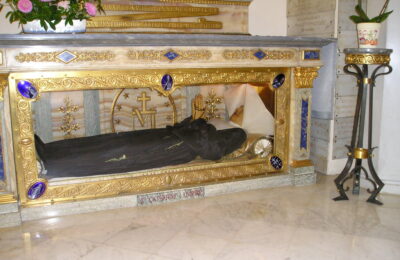“From sin and death He saves us,
And lightens every load.” ~excerpt from “Es ist ein Ros entsprungen”
The beautiful pre-17th century hymn, Es ist ein Ros entsprungen, or Lo, How a Rose E’er Blooming, is a Marian hymn, now known primarily as a Christmas carol. However, for today, I am claiming its Marian origins, and presenting it for your enjoyment. It is a sweet hymn:
“Es ist ein Ros entsprungen” (lit., “A rose has sprung up”), is a Christmas Carol and Marian Hymn of German origin. It is most commonly translated in English as “Lo, how a rose e’er blooming“, and is sometimes known as “A Spotless Rose“. The rose in the text is a symbolic reference to the Virgin Mary, and the hymn makes reference to the Old Testament prophesies of Isaiah which in Christian interpretation foretell the Incarnation of Christ, and to the Tree of Jesse, a traditional symbol of the lineage of Jesus. Because of its prophetic theme, the song is popular during the Christmas season of Advent. The hymn has its roots in an unknown author prior to the 17th century. It first appeared in print in 1599 and has since been published with a varying number of verses and in several different translations… The second verse of the hymns, written in the first person… explains to the listener the meaning of this symbolism: that Mary, the mother of Jesus, is the rose that has sprung up to bring forth a child, who is represented as a small flower (“das Blümlein”). The text affirms that Mary is a “pure maiden” (“die reine Magd”), emphasising the doctrine of the Virgin birth of Jesus. (source)
Here are the delightful lyrics, ladened with the Good News of the Gospel:
Lo, how a Rose e’er blooming
From tender stem hath sprung!
Of Jesse’s lineage coming,
As men of old have sung.
It came, a flow’ret bright,
Amid the cold of winter,
When half spent was the night.Isaiah ’twas foretold it,
The Rose I have in mind;
With Mary we behold it,
The virgin mother kind.
To show God’s love aright,
She bore to men a Savior,
When half spent was the night.This Flow’r, whose fragrance tender
With sweetness fills the air,
Dispels with glorious splendor
The darkness everywhere.
True man, yet very God,
From sin and death He saves us,
And lightens every load. (source of lyrics)
As a nod to the salvific work of Our Lord and Savior Jesus Christ, the bud, the author notes: “From sin and death He saves us, And lightens every load.”
And, without further ado, here is a video recording of the hymn.
Yes, I am listening to a Christmas carol in March, and yes, it is Lent.
Which reminds me of the closing words in G.K. Chesterton‘s masterpiece, Orthodoxy:
The mass of men have been forced to be gay about the little things, but sad about the big ones. Nevertheless (I offer my last dogma defiantly) it is not native to man to be so. Man is more himself, man is more manlike, when joy is the fundamental thing in him, and grief the superficial. Melancholy should be an innocent interlude, a tender and fugitive frame of mind; praise should be the permanent pulsation of the soul. Pessimism is at best an emotional half-holiday; joy is the uproarious labour by which all things live. Yet, according to the apparent estate of man as seen by the pagan or the agnostic, this primary need of human nature can never be fulfilled. Joy ought to be expansive; but for the agnostic it must be contracted, it must cling to one comer of the world. Grief ought to be a concentration; but for the agnostic its desolation is spread through an unthinkable eternity. This is what I call being born upside down. The sceptic may truly be said to be topsy-turvy; for his feet are dancing upwards in idle ecstacies, while his brain is in the abyss. To the modern man the heavens are actually below the earth. The explanation is simple; he is standing on his head; which is a very weak pedestal to stand on. But when he has found his feet again he knows it. Christianity satisfies suddenly and perfectly man’s ancestral instinct for being the right way up; satisfies it supremely in this; that by its creed joy becomes something gigantic and sadness something special and small. The vault above us is not deaf because the universe is an idiot; the silence is not the heartless silence of an endless and aimless world. Rather the silence around us is a small and pitiful stillness like the prompt stillness in a sick-room. We are perhaps permitted tragedy as a sort of merciful comedy: because the frantic energy of divine things would knock us down like a drunken farce. We can take our own tears more lightly than we could take the tremendous levities of the angels. So we sit perhaps in a starry chamber of silence, while the laughter of the heavens is too loud for us to hear.
And:
Joy which was the small publicity of the pagan, is the gigantic secret of the Christian. And as I close this chaotic volume I open again the strange small book from which all Christianity came; and I am again haunted by a kind of confirmation. The tremendous figure which fills the Gospels towers in this respect, as in every other, above all the thinkers who ever thought themselves tall. His pathos was natural, almost casual. The Stoics, ancient and modern, were proud of concealing their tears. He never concealed His tears; He showed them plainly on His open face at any daily sight, such as the far sight of His native city. Yet He concealed something. Solemn supermen and imperial diplomatists are proud of restraining their anger. He never restrained His anger. He flung furniture down the front steps of the Temple, and asked men how they expected to escape the damnation of Hell. Yet He restrained something. I say it with reverence; there was in that shattering personality a thread that must be called shyness. There was something that He hid from all men when He went up a mountain to pray. There was something that He covered constantly by abrupt silence or impetuous isolation. There was some one thing that was too great for God to show us when He walked upon our earth; and I have sometimes fancied that it was His mirth.
So, we keep this great joy even during Lent, knowing that we have a Lord and Savior, Christ Jesus, the bud which bloomed from the Rose.
So, everyday there is behind the happenings of the world, the Good News of the Gospel.
There shot forth from the Immaculate Rose, the bud of life; hence, in the end, all will be well.
~SCF
~Image: Tree of Jesse, source.






